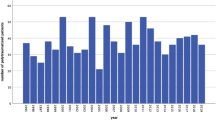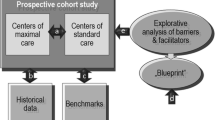Summary
BACKGROUND: Between 1999 and 2001, 368 polytrauma patients were treated at the Departments of Traumatology and Surgery of the Karl Franzens University Hospital in Graz, Austria. In 1993, primary interdisciplinary polytrauma management was introduced in the emergency room. Subsequently, responsibilities were reevaluated regularly and cooperation was found to improve steadily. METHODS: All polytrauma patients were classified using the polytrauma registry of the German Society for Traumatology (Deutsche Gesellschaft für Unfallchirurgie, DGU) for evaluation and statistical analysis. Additionally, polytrauma cases have been analyzed at weekly interdisciplinary meetings since April 2000 to ensure an objectively high quality in polytrauma diagnosis and treatment. RESULTS: For trauma patients with an average Injury Severity Score (ISS) of 26.6, the average lengths of stay in the ICU (8.3 days) and in the hospital (21.8 days), were very short. In the year 2000, actual mortality was lower (18.8%) than that precalculated using Trauma Injury Severity Scale (TRISS). In 2001, this was the 4th best standardized mortality score of all participating trauma facilities. CONCLUSIONS: Primary interdisciplinary teamwork in the emergency room of trauma departments is recommended. Selecting the trauma leader depending on the nature of the patient's injuries is the most logical ongoing step towards a specialized medical system in which patients receive optimal treatment under the direction of the most appropriate specialist. In 83% of all polytrauma cases, the trauma leader was an orthopedic trauma surgeon. As this high standard of polytrauma care can only be guaranteed by a quality-management system, there has to be, in addition to the DGU evaluation, a retrospective weekly analysis of the treatment of polytrauma patients in which all of the involved specialists are invited to participate.
Zusammenfassung
GRUNDLAGEN: An den Universitätskliniken für Unfallchirurgie und Chirurgie am Landeskrankenhaus-Universitätsklinikum Graz wurden in den Jahren 1999 bis 2001 368 mehrfachverletzte Patienten behandelt. Im Jahre 1993 wurde ein interdisziplinäres Polytraumamanagement im Schockraum eingeführt, wobei sich die Zusammenarbeit im Laufe der Jahre verbessert hat und auch die Zuständigkeitsbereiche evaluiert wurden. METHODIK: Alle Polytrauma-Patienten wurden mit Hilfe des Polytraumaregisters der Deutschen Gesellschaft für Unfallchirurgie (DGU) zum Zwecke der Patientenevaluierung und der statistischen Analyse erfasst. Zusätzlich wurden seit April 2000 wöchentliche interdisziplinäre Besprechungen zur retrospektiven Analyse der Polytrauma-Fälle eingeführt, um eine objektiv hohe Qualität in der Polytraumadiagnostik und -behandlung sicher zu stellen. ERGEBNISSE: Bei einem ISS (Injury Severity Score) von 26,6 Punkten betrug die Aufenthaltsdauer auf der Intensivstation 8,3 Tage und im Krankenhaus 21,8 Tage im Durchschnitt. Die Mortalitätsrate, welche mit Hilfe der Trauma-Injury-Severity-Scale-(TRISS-)Methode mit der zu erwartenden Mortalität verglichen wurde, betrug im Jahr 2000 18,8 %. Im Jahr 2001 ergab diese Zahl den viertbesten Wert aller teilnehmenden Kliniken. SCHLUSSFOLGERUNGEN: Eine primäre interdisziplinäre Zusammenarbeit im Schockraum von allen chirurgischen Abteilungen wird empfohlen. Die Wahl des Trauma-Teamleiters entsprechend dem Verletzungsmuster der Patienten ist der nächste Schritt auf dem Weg zu einem spezialisierten Gesundheitssystem mit optimaler Versorgung durch entsprechende Fachärzte. Der orthopädische Unfallchirurg war in 83 % aller Fälle der Trauma-Teamleiter. Um einen hohen Standard in der Polytrauma-Versorgung sicher zu stellen, muss eine Form von Qualitätsmanagement eingeführt werden. So wird in Graz zusätzlich zur DGU-Evaluierung eine wöchentliche Analyse der Polytrauma-Patienten unter Anwesenheit aller beteiligten Fachärzte durchgeführt.
Similar content being viewed by others
Author information
Authors and Affiliations
Corresponding author
Rights and permissions
About this article
Cite this article
Szyszkowitz, R., Grasslober, M., Uranüs, S. et al. Interdisciplinary trauma management and quality assessment at the Karl Franzens University Hospital, Graz. Eur Surg 36, 33–37 (2004). https://doi.org/10.1007/s10353-004-0026-2
Received:
Accepted:
Published:
Issue Date:
DOI: https://doi.org/10.1007/s10353-004-0026-2




